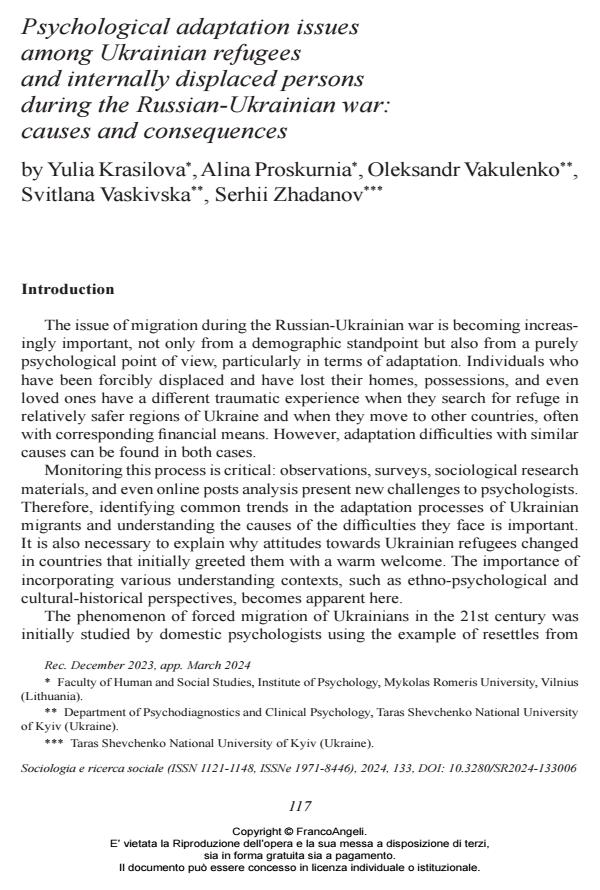Psychological adaptation issues among Ukrainian refugees and internally displaced persons during the Russian-Ukrainian war: causes and consequences
Journal title SOCIOLOGIA E RICERCA SOCIALE
Author/s Yulia Krasilova, Alina Proskurnia, Oleksandr Vakulenko, Svitlana Vaskivska, Serhii Zhadanov
Publishing Year 2024 Issue 2024/133
Language English Pages 17 P. 117-133 File size 223 KB
DOI 10.3280/SR2024-133006
DOI is like a bar code for intellectual property: to have more infomation
click here
Below, you can see the article first page
If you want to buy this article in PDF format, you can do it, following the instructions to buy download credits

FrancoAngeli is member of Publishers International Linking Association, Inc (PILA), a not-for-profit association which run the CrossRef service enabling links to and from online scholarly content.
The current article investigates the psychological and social challenges that displaced people face in the context of the Russian-Ukrainian war. The authors focus on the consequences of traumatic experiences, language situations, and the correlation between migrants’ aggression and loneliness. The comparative study was concentrated on Ukrainians who relocated to other countries, including Po- land, Germany, and Canada, as well as those who had been internally displaced to Kyiv. The findings indicate a high level of aggression, particularly among men, associated with circumstances and a sense of loss. The factors that con- tribute to adaptation difficulties for Ukrainian forced migrants and immigrants were identified, and it was outlined how the absence of group support and social integration can exacerbate adaptation problems. The article’s overall conclusion emphasises the importance of understanding the psychological aspects of dis- placed individuals’ adaptation in order to overcome challenges and form a positive image of a country.
- A. Alexeeva (2023), Integration of Ukrainian refugees into the life of another country: Psy- chological aspects, in Psychology in the Face of the Ukrainian-Russian War: Collection of Abstracts of the Ukrainian-Polish Scientific Conference, May 19-20, 2023, Lviv.
- G. Bazzani (2023), «Agency as conversion process», Theory and Society, 3, 52, pp. 487-507.
- L. Berkovits (2001), Aggression: Causes, consequences, and control, Kharkiv, Prime-Evroznak.
- A. Elhami, A. Roshan (2023), «A narrative study of Iranian females’ acculturation orientation and Spanish learning experiences in Spain», Strategies for Cultural Assimilation of Immi- grants and Their Children: Social, Economic, and Political Considerations, 4, pp. 45-68.
- A. Fujiwara (2012), Ethnic elites and Canadian identity: Japanese, Ukrainians and Scots, 1919-1971, Great Britain, University of Manitoba Press
- H.M. Gromova (2021), Tolerance to uncertainty and attitude to time as mediators of post-trau- matic personality recovery. Measurements personal transformations: materials of the IV All-Ukrainian Scientific and Practical Seminar (Nizhyn, October 6, 2021), T.M. Tytarenko (ed.), Kyiv, Ispp Napn of Ukraine. .
- A.S. Huliaieva, Yu.O. Kovalchuk (2019), «Analysis of empirical data on life satisfaction and personal belief systems in crisis conditions», Theory and Practice of Modern Psychology, 2, 1, pp. 37-41.
- M. Lakin (1972), Interpersonal encounter: Theory and practice in sensitivity training, New York, McGraw-Hill.
- J.C. Lehr (2011), Community and Frontier: A Ukrainian settlement in the Canadian Parkland, Winnipeg, University of Manitoba Press.
- G. Mulyasari, A. Trisusilo, N. Windirah, I.N. Djarot, A.S. Putra (2023), «Assessing Perceptions and Adaptation Responses to Climate Change among Small-Scale Fishery on the Northern Coastal of Bengkulu, Indonesia», Scientific World Journal, article number 8770267.
- F. Neto (2023), «Perceived discrimination, adaptation and saudade among African migrants», International Journal of Migration, Health and Social Care, 19, 3-4, pp. 285-98.
- B. Patnaik (2023), «The cultural basis of human behaviour and ethnography», Ethnographic Research in the Social Sciences, 90, pp. 111-21.
- O.V. Pomazova (2013), «Loneliness as a psychological phenomenon», Scientific Notes of Donetsk University, pp. 206-14.
- W.A. Sadler, T.B. Johnson (1980), From loneliness to anomie, J. Hartog, J.R. Audy, Y.A. Cohen (eds.), New Yorkm International Universities Press.
- M. Skirka (producer) (2023, July 14), Poles are tired of Ukrainians: What fakes are creat- ed to make Poles fed up with our people [video], available at https://www.youtube.com/ watch?v=WK6dkv4_B-4&t=141s.
- Tsang, Seng-Su, T.V.T. Nguyen (2023), «Sociocultural adaptation and job satisfaction as me- diators between cultural competence and intention to stay among Vietnamese workers in Taiwan», Humanities and Social Sciences Communications, 10, 1, article number 292.
- Ukrainian Center for Economic and Political Research named after Oleksandr Razumkov (2023), -- available at https://razumkov.org.ua/images/2024/01/29/2024-Pyshchulina-ED- NANNYA-SITE.pdf.
- L. Wang, J. Chao, Y. Wu, N. Zhang, M. Bao (2024), «Social integration and utilization of na- tional basic public health services among China’s internal migrants with chronic diseases: A structural equation modelling approach», Heliyon, 10, 3, article number e25797.
- V.O. Yaniv (2006), Essays on the history of Ukrainian ethnopsychology, Kyiv, Znannia
Yulia Krasilova, Alina Proskurnia, Oleksandr Vakulenko, Svitlana Vaskivska, Serhii Zhadanov, Psychological adaptation issues among Ukrainian refugees and internally displaced persons during the Russian-Ukrainian war: causes and consequences in "SOCIOLOGIA E RICERCA SOCIALE " 133/2024, pp 117-133, DOI: 10.3280/SR2024-133006